Lockdown has screwed up our sleep cycles. Here how to fix it

You might have noticed your normal sleep pattern has changed. Some of us may be sleeping more, and some of us may be sleeping less. Life has changed dramatically for many of us, with our usual daily routine — including commutes, meal times, and the amount of time we spend outside — being altered because of self isolation.
All of these changes impact our natural circadian rhythm, which is an essential internal “clock” that plays a key role in regulating our sleep pattern. It controls body temperature and hormones in order to make us feel alert during the day and tired at night.
Exposure to natural light and regular meal times are two of the most powerful forces in aligning our circadian rhythms. But for many of us, quarantine has changed the amount of time we spend outside, and we might be eating at different times than normal.
While some of us are reconnecting with our natural circadian rhythm, others might have trouble falling asleep, or may be waking up multiple times during the night. This is also a normal experience, as uncertainty can increase stress levels and stress hormones (such as cortisol), which help regulate our sleep-wake cycle. Cortisol normally drops in the evening, reaching its lowest level at midnight. But if levels are too high before bedtime, it could disrupt sleep.
Some of us might also be sleeping more, catching up on lost hours. Many of us have so-called “sleep debt”, which is the cumulative effect of not getting enough sleep, and may lead to mental and physical fatigue. As we juggle our daily tasks, we often run out of hours in the day to get things done — so many of us choose to sleep less to do more.
Sleep debt (also known as sleep deprivation) is associated with declines in performance, memory and our immunity.
If you are sleeping longer than normal, you may be repaying some of that sleep debt acquired in life. Don’t panic here — let your body catch up and erase some of that debt you have subconsciously been carrying around. Sleep loss studies that have allowed recovery sleeps of ten hours have demonstrated a restoration of performance when the participants are awake, suggesting this is a fixable problem.
The solutions
1. Establish a new routine. You may have been furloughed or be working from home for the first time. Routine is very important for the body right now. This will be the starting block for engaging with your natural circadian rhythm — not the one your job normally sets. Start by focusing on your sleep-wake cycle, go to bed when you feel tired and try to wake up without an alarm. You may sleep a little more than normal at the beginning, but within a week or two you will return to your natural duration. Though everyone is different, you should aim for 7-9 hours a night. Not only is routine good for our sleep cycle, it’s also beneficial to our mental health.
2. Don’t use your bedroom as your office (if possible). When it’s time for bed, remove electronic devices and make the room cool, dark and quiet. It’s important to associate your bedroom as the place you go to sleep, not the place you work or watch TV. This will help you to relax and prepare for sleep. Electronic devices also emit artificial light that can influence our sleep cycle. Artificial light can trick your circadian clock into thinking daylight has been extended and alter our quality of sleep. If you need electronic devices nearby, place them in night mode.
3. Avoid napping. As you try to establish your new routine, it’s important to engage with your natural circadian rhythm — and napping could potentially disrupt this at the beginning. However, if your previous night’s sleep was poor you may feel more tired after lunch. Short naps — less than 20 minutes — can help to restore cognitive function and may make you feel less sleepy.
4. Only drink caffeine before noon. We all respond a little differently to caffeine. Because caffeine is a known stimulant, it could influence our sleep by keeping us awake later. So when trying to fix your sleep pattern, it may be best to limit caffeine intake to earlier in your day.
5. Exercise. Both aerobic and resistance exercise has been shown to have positive effects on sleep. However, timing is important. It’s best to avoid vigorous exercise one hour before bedtime as this may reduce our sleep duration, quality and make it more difficult to fall asleep in the first place.
6. Get outside. Exposure to both natural light and dark during this time will help us keep our circadian rhythms in balance, and make us tired.
7. Change your bedtime routine. At least an hour before bed stop work, reduce screen time, meditate, or read. These techniques allow us to relax and help our circadian rhythm take control by releasing hormones that will promote sleep and reduce alertness.
Though it’s still uncertain what life will look like after quarantine has ended, one thing for certain is that if we look after our sleep pattern during this time, we may leave quarantine feeling less fatigued – and maybe a little more productive.
This article was originally published on The Conversation by Lesley Ingram-Sills at Edinburgh Napier University. Read the original article here.